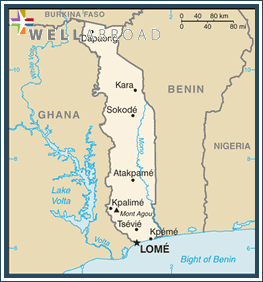|
MOST RECENT ALERTS
There's no recent alert.
|

|
|||||||||||||||
| COUNTRY OVERVIEW | ||||||||||||||||
|---|---|---|---|---|---|---|---|---|---|---|---|---|---|---|---|---|
|
| COUNTRY GENERAL INFORMATION | |||||||
|---|---|---|---|---|---|---|---|
| Language: |
French (official and the language of commerce), Ewe and Mina (the two major African languages in the south), Kabye (sometimes spelled Kabiye) and Dagomba (the two major African languages in the north) |
||||||
| Currency: | Communaute Financiere Africaine francs (XOF) | ||||||
| Predominant Religions: |
Christian 29%, Muslim 20%, indigenous beliefs 51% |
||||||
| National Holidays: | Independence Day, 27 April (1960) | ||||||
| Economic Status: |
This small, sub-Saharan economy is heavily dependent on both commercial and subsistence agriculture, which provides employment for 65% of the labor force. Some basic foodstuffs must still be imported. Cocoa, coffee, and cotton generate about 40% of export earnings with cotton being the most important cash crop. Togo is the world's fourth-largest producer of phosphate. Economic growth remains marginal due to declining cotton production, underinvestment in phosphate mining, and strained relations with donors. |
||||||
| Security: |
Togolese Armed Forces (Forces Armees Togolaise, FAT): Ground Forces, Togolese Navy (Marine du Togo), Togolese Air Force (Force Aerienne Togolaise, FAT), National Gendarmerie |
||||||
| US Presence: | |||||||
| Document Requirements: |
A passport and visa are required. Travelers are encouraged to obtain visas prior to arrival due to recent difficulties in obtaining them at the airport in Lomé or at some of the land borders. Visas issued in Togo are limited to 7 days and can take an hour or more to be issued. Travelers applying for visa extensions can also experience significant delays. Vaccination against yellow fever is also required before entry. U.S. citizens should carry copies of their U.S. passports and vaccination records with them at all times while traveling in Togo so that, if questioned by local officials, they have proof of identity, U.S. citizenship, and required vaccinations readily available. Travelers may obtain additional information from the Embassy of the Republic of Togo, 2208 Massachusetts Avenue NW, Washington, DC 20008; telephone (202) 234-4212. Overseas, inquiries should be made at the nearest Togolese embassy or consulate. The U.S. Department of State is unaware of any HIV/AIDS entry restrictions for visitors to or foreign residents of Togo. Information about dual nationality or the prevention of international child abduction can be found on our website. For further information about customs regulations, please read our Customs Information page. |
||||||
| Major Airports: |
Airports: 8, Airports with paved runways: 2 Lomé-Tokoin Airport (LFW/DXXX)
|
||||||
| Servicing Airlines: |
|
||||||
| Risks and Precautions: |
US citizens are urged to avoid political rallies and street demonstrations, and to maintain security awareness at all times. Togo has experienced periodic violence, strikes, and political tensions since 1990. Following the death of President Eyadema in February 2005, political activists took to the streets and held demonstrations throughout the country that resulted in more than 500 deaths. Land borders with Ghana and Benin are routinely shut down during elections. The October 2007 legislative elections were non-violent with only minor incidents reported during the single post-election demonstration. The next major elections are the presidential elections scheduled for 2010. |
||||||
| Mortality Statistics: |
Infant MR total: 56.84 deaths/ 1,000 live births |
||||||
| Immunization Indicators: |
Required: Yellow fever vaccination requirement for travelers to Togo: Required upon arrival from all countries if traveler is ≥1 year of age. CDC recommendation: For all travelers ≥9 months of age. Vaccination should be given 10 days before travel and at 10 year intervals if there is on-going risk. |
||||||
| Infectious Disease Concerns: |
Areas of Togo with Malaria: All. |
||||||
| Overall Quality of Medical Services: |
Medical facilities in Togo are limited and of very poor quality; emergency medical care is inadequate. Availability of medications through local pharmacies is unreliable, and travelers should carry all necessary medications, properly labeled, with them. Malaria, a serious and sometimes fatal disease, is prevalent in Togo. For additional information on malaria, including protective measures, see the CDC travelers’ health website. |
||||||
| Providers in Network: |
|
||||||
| Recent Medical Threats/ Concerns/Warnings: |
Polio outbreaks were reported in several previously polio-free countries in Central, Eastern, and Western Africa beginning in 2003. Polio is still endemic in Nigeria. Highly pathogenic avian influenza (H5N1) has been found in poultry populations in several countries in Africa. Avoid all direct contact with birds, including domestic poultry (such as chickens and ducks) and wild birds, and avoid places such as poultry farms and bird markets where live birds are raised or kept. For a current list of countries reporting outbreaks of H5N1 among poultry and/or wild birds, view updates from the World Organization for Animal Health (OIE), and for total numbers of confirmed human cases of H5N1 virus by country see the World Health Organization (WHO) Avian Influenza website. |
||||||
| Communications Info: |
Country Calling Code: +228 |
||||||






